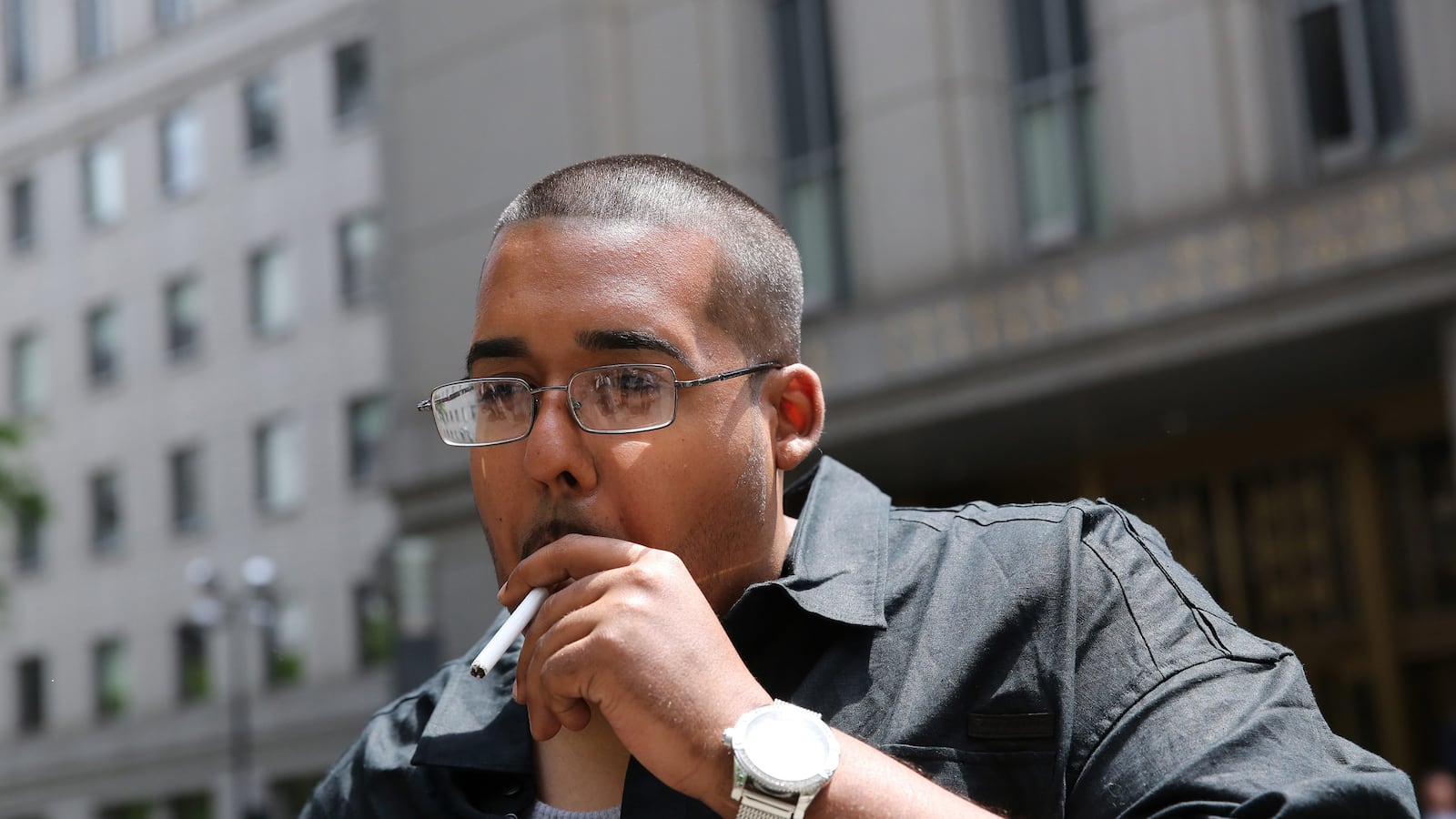The government moved the proceedings to the big ceremonial courtroom, for this was to be the sentencing of 30-year-old Hector Xavier Monsegur, the biggest informant in the history of cyber crime, the guy the feds say prevented 300 attacks.

But apart from government people and reporters, there were only three spectators when Monsegur trundled his bulky self into the cavernous chamber on the ninth floor of Manhattan federal court late Tuesday morning. And they appeared to be relatives.
Monsegur dubbed himself Sabu in the hacker world, after a wrestler of that name who is purportedly from Saudi Arabia and is in fact a Lebanese American from Detroit. Monsegur has the original Sabu’s size but seemingly little of his physical prowess. He looked like the world’s largest nerd as he stood before the judge in an outsize black short-sleeved shirt, baggy tan pants, and wire-rim glasses.
“The United States v. Hector Monsegur,” Judge Loretta Preska said.
The ensuing proceeding sounded more like The United Sates with Hector Monsegur, as the defense attorney, the prosecutor, and the judge filled the empty chamber with hyperbolic descriptions of Monsegur’s cooperation with the government.
“We have never witnessed a case like this,” defense attorney Peggy Cross-Goldenberg said.
“Through his cooperation, we averted untold millions of dollars in loss to victims,” Assistant U.S. Attorney James Pastore said. “We also averted potential really catastrophic problems with critical infrastructure.”
“It was truly extraordinary,” the judge said. “We don’t often hear of this.”
She added that she was particularly impressed that Monsegur had decided to cooperate almost immediately after his 2011 arrest. And he had not just named names, he had thrown himself completely into helping the FBI build a case against his fellow hackers.
“The immediacy of Mr. Monsegur’s cooperation and its around-the-clock nature was particularly helpful to the government,” she said. “That personal characteristic of turning on a dime to doing good, not evil, is the most important factor in this sentencing.”
The judge did not seem to consider that it was the circumstances that turned on a dime and that Monsegur had simply continued to do what he felt was good for Monsegur. She praised him for not only confessing to the crime for which he was accused but to crimes the FBI did not even know he had committed. She was not so cynical as to think that he had done so figuring this was exactly what would impress her and the prosecutors.
“You have done as much as any human being can do in terms of helping the government to make up for your past wrongs and to avert other damage to probably millions of people,” the judge went on to say. “So, I salute you for that.”
The courthouse windows to Monsegur’s left looked out in the direction of the Lower East Side and the housing project where he is something of a hero, despite being a snitch. He was raised in the Jacob Riis Houses by his grandmother while his father and his aunt were doing seven-year prison terms for selling heroin. He had dropped out of struggling Washington Irving High School, which is in a hand-me-down building vacated by Stuyvesant High School when that fabled academy for math and engineering whizzes moved to newer and grander quarters.
But he had marked himself as different by not talking street. And he became the stuff of project legend as he taught himself code and programming. That his computer keyboard was missing the L, 7 and Shift keys made it only more miraculous that he could dramatically improve a neighbor’s credit rating or order himself more than $3,000 in auto parts without having to pay for them.
Even after it became known he was an informant, his neighbors could not help but be impressed also to hear that he had helped to hack big-time corporations and governments as music blasted all night from behind his door and the smell of pot smoke seeped into the hallway. The guy had been messing with the president of Tunisia’s website while sitting in a sixth-floor apartment on Avenue D.
The FBI seems to have been no less impressed, though fellow hackers have described Monsegur’s cyber skills as respectable enough but unremarkable. The FBI might have been easy to wow because its own skills appear to be so modest. The FBI only caught Monsegur in the first place as the result of initial investigative work undertaken by two private citizens, a housewife and a man with mild brain damage from a motorcycle accident, who had become disenchanted with the more extreme “hacktivists.”
The FBI’s subsequent criminal complaint describes Monsegur as part of “an elite hacking collective” and having “served primarily as a ‘rooter,’ analyzing code for vulnerabilities which could be exploited.”
In truth, Monsegur seems to have been less adept at analyzing code than he was at analyzing coders—along with FBI agents, prosecutors, and ultimately a judge—for vulnerabilities that could be exploited. He manipulated a number of hackers into providing information that led to their identification and arrest. And he seems to have persuaded at least one to attempt a crime the future defendant otherwise might not have contemplated.
Among those he cheered on was Jeremy Hammond, listed as the FBI’s most wanted cyber criminal. Hammond was sentenced in the same Manhattan courthouse by the very same judge to 10 years in prison. Monsegur appeared to have urged Hammond to hack the websites of several foreign governments.
“Trust me,” Monsegur said in one cyber chat with Hammond. “Everything I do serves a purpose.”
Monsegur’s immediate purpose was to please the FBI. Skeptics have suggested that the FBI was attempting a kind of two-for in which it built a case against a hacker while gleaning whatever data about the foreign websites the hacker passed on.
“Relax, I am a federal agent,” he told a city cop who asked him for identification outside the projects one night.
In any event, there is no disputing that the FBI recorded all of Monsegur’s cyber communications and activities while he was at liberty as an informant.
“During this time the defendant has been closely monitored by the government,” the prosecutor, Pastore, said during a subsequent hearing. “We have installed software on a computer that tracks his online activity. There is also video surveillance in the defendant’s residence.”
That continued until March 2012, when the FBI arrested Hammond along with four others. The press release revealed Monsegur to be an informant.
Monsegur remained at liberty until that May, when his bail was revoked for postings that the government declines to identify. He was freed after seven months.
At Tuesday’s sentencing, Monsegur’s attorney suggested that the relatively brief time behind bars was enough considering her client’s cooperation, which the judge described as “extraordinary” a half-dozen times. The judge asked Monsegur if he had anything to say and he rose.
“Good morning, your honor,” he said.
“Good morning, sir,” the judge said.
“I came a long way,” Monsegur said of the time since his arrest. “I had to do a lot of thinking, a lot of soul searching.”
He paused.
“I assure you, you won’t see me in this courtroom again. I’m not the same person you saw three years ago. I’m ready to move on.”
Monsegur sat.
“If there are any victims in the courtroom who would like to be heard,” the judge said.
There was only silence. This was at least not one of those cases where an informant gets a pass on multiple murders. And the government was claiming that Monsegur may have actually saved people, by thwarting some hackers who had figured out a way to contaminate an entire city’s water supply.
“Seeing none,” the judge said.
The judge noted that during his time in jail, Monsegur had taught computer basics to his fellow prisoners.
“I salute you,” she said. “You seem to be on the right path.”
She added that Monsegur had no prior criminal record. She also accepted the defense attorney’s contention that Monsegur had became an informant in the first place for fear that the young cousins who had been left in his charge would be consigned to the horrors of the foster care system. She praised him for his continuing dedication to them.
“That he was able to continue that high level of devotion when he was under such personal stress is a great tribute to him,” the judge said.
Her sentence came as no surprise.
“Time served.”
She had some advice.
“The things you did before were not so good,” she said. “You obviously have great skill. To deploy that skill for good would be a very good thing.”
She was speaking of his cyber skills. But as the big case ended in the big empty courtroom, a question hung in the air.
In the criminal complaint where Monsegur is termed a “rooter” who specialized in analyzing code for vulnerabilities, another of the hackers is described as specializing in “social engineering.”
“That is, manipulating others into divulging personal information,” the complaint says.
The question is whether it was really Monsegur who was the master social engineer, his genius not in reading code but coders, along with everybody else, including the defense attorney and the prosecutor, who both embraced him at the end, and the manifestly decent and good-hearted judge, who set him free.






